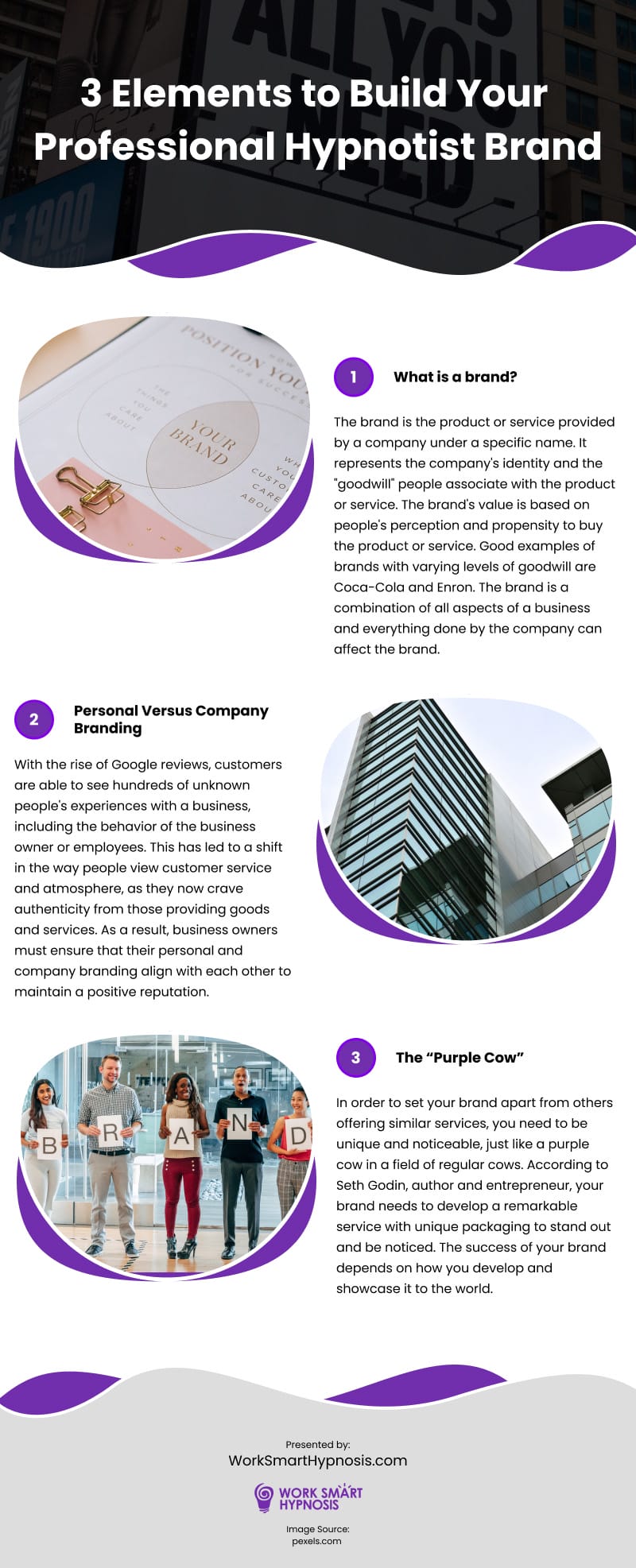It feels like everywhere you look, there is some kind of branding. Ads inundate social and traditional media, and logos are plastered on almost every surface. Even the airways are filled with people sharing their products and services. You’ve probably found yourself humming some commercial’s jingle when you can’t sleep at 2:00 am. Case in point: just reading the words, “Bah duh baba baaaaa, I’m lovin’ it!” has you singing a song to yourself right now. These are all ways businesses showcase their brands.
Developing your brand as a hypnosis business owner is crucial if you want to make it in the cutthroat entrepreneurial world. But as much as we throw out the words “brand,” “branding,” and “building your brand,” that specific terminology is relatively new to the business world. Sure, people have been marketing their products or services in particular ways for a very long time, but the emphasis on branding your business is somewhat new. What’s hard about branding is that it’s extremely broad but essential to your success.
Over the next three blog posts, I will dive into the world of branding and how you can use it to strengthen your new or existing professional hypnotist business.
What is a brand?
Your brand is the product or service you provide under a specific name. It is your company’s identity. In business, your brand is the “goodwill” that people associate with your product or service. In a real sense, it’s the dollar value you can assign to a product or service based on the perceptions and propensities of others toward buying that product or service.
Two good examples of varying levels of goodwill are Coke and Enron.
Whether or not you like the taste of Coke, you can’t deny that when you see those swirly-whirly red or white letters, you know exactly what the product will be: a consistent, sweet, carbonated beverage that tastes the same whether you’re in Des Moines, Iowa or Paris, France. That level of consistency has persisted for over a hundred years, and consequently, people have a significant amount of goodwill toward the brand.
On the other hand, Enron was an extremely well-known energy company that was even named “America’s Most Innovative Company” for six straight years by Fortune Magazine. Then, due to misrepresentation, manipulation, and scandal, the company tanked and lost investors and employees a ton of money. It went from a highly established brand with plenty of goodwill to a bankrupt one with little to no goodwill. You still probably recognize the logo for Enron, but it won’t elicit fuzzy feelings like it once did because the brand was disgraced.
Your brand is a combination of all aspects of your business. From your personal philosophies to your marketing strategies to your merchandise – everything you say and do can help or hurt your brand, so you want to develop it with purpose.
Personal Versus Company Branding
Gone are the days when you could have a good product with a poor bedside manner. In the past, people would excuse lousy customer service or an underwhelming atmosphere if the product was okay in the end. But people these days crave authenticity from the people who provide them with goods and services, so the lines between personal and professional branding are getting blurry.
Google reviews have been a driving force behind this change in mentality. Before reviewing was so prevalent, people only had opinions from people they knew personally. If their friend had a good experience, they could reasonably assume they would also have a good experience.
But with Google reviews, your clients can now read hundreds of unknown people’s experiences and decide whether trying out your business is worth the risk. And those experiences might not just be with your product or service – they could be with you as a person or one of your employees. That puts a lot of pressure on you as the business owner to ensure that your personal and company branding and philosophies are always in sync with each other.
The “Purple Cow”
Distinguishing your brand from another company’s can be tricky and overwhelming. You believe in the service you are providing, but how do you set yourself apart from others offering a similar service?
Seth Godin, an influential author and entrepreneur, has a metaphor for that. In his “Purple Cow” scenario, you pass by a cow pasture. In it, you see a lot of cows in varying shades of white, black, gray, and tan. These represent the other businesses in your field of work. Then suddenly, you forget all the other cows in the field because you see a purple cow grazing by the fence. It’s astonishing – you’ve never seen a purple cow before! You simply must learn more about it!
If you want your brand to succeed, you need to be the purple cow standing by the fence, demanding that everyone looks at you. You need to develop a remarkable service with remarkable packaging that is as unique and enticing as a purple cow standing amidst the tan ones. Essentially, how well your company does compared to other companies depends on how you develop it and show it to the world. But how do you do that? More in our next two articles.
Infographic
Branding is a crucial aspect of establishing a business, especially for hypnotherapy business owners. It is a modern concept with a focus on building and promoting a brand. Despite its expansive nature, branding remains a critical element of success. In the upcoming three blog posts, I will explore how to harness branding’s power to fortify your hypnotist business, ensuring its continued growth and success.
Video




